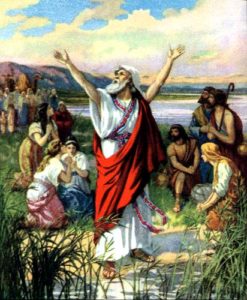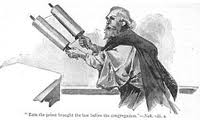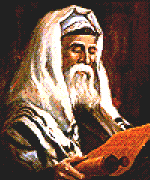BIBLE TEXT: Ezra 7:1-5, 6, 10, 11
 QUESTION TO CONSIDER: Are you a diligent Bible student? Let’s learn to have a great love for the word of God and a strong desire to study it and know it as Ezra did.
QUESTION TO CONSIDER: Are you a diligent Bible student? Let’s learn to have a great love for the word of God and a strong desire to study it and know it as Ezra did.
BIBLE LESSON:
The book of Ezra is the 15th book in the Old Testament. It has 10 chapters that mostly talk about the first and second returns of the Jews to Jerusalem from Babylonian captivity and the rebuilding of the temple. But we also learn a little bit about a man named Ezra as well.
Ezra was a scribe and a priest. Do you know what a scribe is? Originally, a scribe was someone who wrote documents and books by hand. These were usually for a king or some other important person in government. There was also another group of scribes, mostly from the tribe of Levi, that worked on temple documents and religious writings. By the time Ezra was written, there were scribes who were given the job of making copies of the Law which would be the first five books of the Bible: Genesis, Exodus, Leviticus, Numbers and Deuteronomy. Take a look in your Bible and see  how many pages it is from Genesis chapter 1 to the last chapter in Deuteronomy. How long do you think it would take you to copy all of that? Not only would the scribes make one copy of the Law, but often they would make more than one copy. That would be a lot of work! How well do you think those scribes would know those five books of the Bible after reading and copying it over and over again? Ezra was one of these scribes. Read Ezra 7:6. How is Ezra described in this verse? Read Ezra 7:11. How is Ezra described in this verse?
how many pages it is from Genesis chapter 1 to the last chapter in Deuteronomy. How long do you think it would take you to copy all of that? Not only would the scribes make one copy of the Law, but often they would make more than one copy. That would be a lot of work! How well do you think those scribes would know those five books of the Bible after reading and copying it over and over again? Ezra was one of these scribes. Read Ezra 7:6. How is Ezra described in this verse? Read Ezra 7:11. How is Ezra described in this verse?
We also learn from the book of Ezra that he was a priest. A priest had to come from the tribe of Levi and be a descendant of Aaron. So all priests were Levites, but not all Levites were priests. In Ezra 7:1-5, we read that Ezra could trace his family line all the way back to Aaron.
One of the reasons that Ezra was such a good scribe is that he loved the Word of God. Read Ezra 7:10. What three things does this verse say Ezra did?
- He prepared his heart to seek the Law of the Lord.
- He obeyed it.
- He taught it to others.
This is a great example for us to follow today! We should love the Bible so much that we want to read and study it. As we learn more and more about what God’s Word says, we see  things we are to do and not to do. When we prepare our heart to seek God’s Law as Ezra did, we will want to obey what God says. As we continue to grow in knowledge of the Word of God, we should become able to share it and teach it to others.
things we are to do and not to do. When we prepare our heart to seek God’s Law as Ezra did, we will want to obey what God says. As we continue to grow in knowledge of the Word of God, we should become able to share it and teach it to others.
Scribes were not the only ones who made copies of the Law. Read Deuteronomy 17:18-20. Hundred of years before Saul ever became the first king of Israel, God had already laid out some instructions for each king of Israel. One of them was that each king was to make his own copy of the law. He wasn’t supposed to order a scribe to do it for him, but he was to sit down and write out his own copy of the Law – word for word. What did God want each of the kings to do with their copy? Were they to stick it on a shelf when they were done and forget about it? Absolutely not! They were to take it with them and read it every day. Why? If they were to read and study God’s Word continually, it would help them to love and respect God properly and to obey what He said. It would also help them to be good kings because their love and obedience to God would help them make wise and right decisions for their kingdom.
Okay, so you are not a king of Israel or a scribe and priest like Ezra, but being a good Bible student is still something that you would really like to be. If you need some help getting started, here are 5 steps for studying the Bible:
- Pray – Ezra “prepared his heart to seek the Law of the Lord.” If you pray to God before you open your Bible and ask Him to help you learn something and to have a heart that is open to His will, He will guide you and help you as you study His Word. He wants you to love it and grow in it!
- Read carefully – When you read the Bible, try to pick a comfortable place that is quiet with no distractions. You can’t study diligently with one eye on the Bible and the other eye on a screen. As you read, take your time and concentrate on the words. If you find your mind wandering, go back and reread slowly, thinking carefully about what you are reading. It’s okay if you need to read a certain verse or verses several times to help you understand. If it helps you stay focused, take notes or draw little pictures or symbols in your notebook that remind you of the chapter or passage.
- Look it up! – As you study, you may want to sit by the computer or have a Bible dictionary, concordance, and atlas available. As you read, you will run across words that you don’t know the meaning of. Stop and look up the definitions, and write them down in a notebook. Then, go back and reread the verse containing the word and see if it makes more sense to you, now that you know the meaning of the new word. Also, if you are reading about different cities, rivers, or other geographical locations, stop and look them up in a Bible atlas or on a map in your Bible. This too, can help you understand more about what you’re reading when you can “see” the locations being talked about.
- Dig deeper – This is one of my favorite steps! I love learning more about different Bible subjects such as feasts, groups of people, marriage customs, money, and more. When you start reading in the New Testament, you find the names of two groups: the Pharisees and the Sadducees, but you don’t know where they came from or what they believe, etc. This is where you have to dig deeper! Look them up in a Bible encyclopedia or Bible dictionary and write down what you learn about them. Then every time you read about them in the New Testament, you understand much more about these two groups so that their conversations with Jesus and their treatment of Him and His disciples begin to make a lot more sense. Research any Bible subject you run across that you want to learn more about or that you are not familiar with.
- Memorize and Meditate – As we read and study, it is important to keep hiding God’s Word in our heart by memorizing. We can certainly memorize Bible verses, but it is also helpful to memorize lists of things such as judges of Israel, 12 sons of Jacob, the days of creation, etc. Think of your mind as a storage vault where you keep putting more and more information from the Bible. You will have it available to use for years to come! After you have spent time reading and studying the Bible, think about it during the day. This is what it means to meditate on it. Think about what lessons you learned and how you can use those lessons to make changes in your life.
If you think this sounds like a lot of work, it is! That’s what it takes to really study the Bible, but it is so worth it as you grow in God’s Word by leaps and bounds.
Ezra the skilled scribe teaches us what it means to be a good Bible student: prepare your heart to seek God’s Word, be skilled in the Word, obey it, and share it with others.
REVIEW QUESTIONS:
- What is a scribe?
- How was Ezra described in Ezra 7:6? In Ezra 7:11?
- What are the five books of the Law?
- Why was each king of Israel supposed to make his own copy of the Law?
- What are 5 helpful steps for studying the Bible?
MEMORY VERSES:
- II Timothy 2:15 – Be diligent to present yourself approved to God, a worker who does not need to be ashamed, rightly dividing the word of truth. (NKJV)
- Ezra 7:10a – For Ezra had prepared his heart to seek the Law of the Lord, and to do it…” (NKJV)
WORD OF THE WEEK: STUDY – to exert oneself; endeavor; give diligence
Greek word – Spoudazo (spoo-dad’-zo) σπουδάζω
The King James version of II Timothy 2:15 says, “Study to shew thyself approved unto God…” The Greek word spoudazo is a verb whose definition shows us that studying takes a lot of personal effort! We must work hard to study the Bible and learn from it, but the hard work is so very rewarding.
*Hebrew was the original language of the Old Testament. Greek was the original language of the New Testament.

DID YOU KNOW? The scribes who copied the Law had very strict guidelines to follow. A special kind of ink had to be used. The scribe had to speak each word aloud as he wrote it. No two letters could touch each other. The letters, words, and paragraphs had to be counted. The scribe had to wipe his pen and wash his whole body before writing the word “Jehovah” – every time he wrote it. The scribe was not allowed to write from memory but had to write his copy from an existing copy. The finished copy of the Law had to be letter perfect. No mistakes!
ADDITIONAL ACTIVITIES:
- Memorize the 66 books of the Bible
- Sword Drills – Practice using your Bible and getting more familiar with it by doing sword drills. This link includes instructions and a list of scriptures to get you started.
- Daily Bible study plan – Write out or type up a daily Bible reading schedule to help you read and study God’s Word every day. As you read, remember to use the Bible study tips that were mentioned in this lesson. Be like Ezra and prepare your heart to seek God’s Word.
- Scroll Craft – This link provides instructions on how to make a scroll. Once it’s completed, copy one of the memory verses from above or your favorite Bible verse on it. (Don’t forget to use your neatest handwriting!)
- Ezra coloring page – Free printable coloring page of Ezra reading the law to the people
If you enjoy these Bible lessons, please visit our Product Catalog page to view our “Growing Up in God’s Word“ Bible curriculum for children series. Each title is an in-depth Bible study including multiple enrichment activities with each lesson such as map work, research projects, application activities, crafts, and more.


Ezra the skilled scribe is an interesting article and blessing one
I was so blessed and highly impacted by the secret I learnt from this article. I received insight on how to study and understand the scriptures in a dynamic character by the testimony of Ezra the skilled scribe. I am thank you alot today.